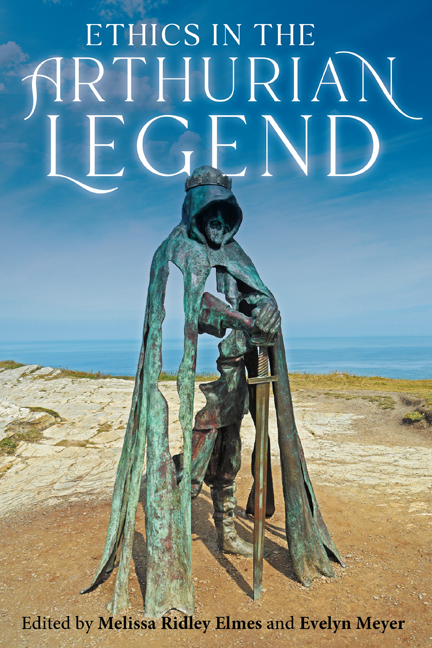Book contents
- Frontmatter
- Contents
- List of Contributors
- Foreword
- Acknowledgments
- Introduction
- 1 Arthurian Ethics before the Pentecostal Oath: In Search of Ethical Origins in Culhwch and Olwen
- 2 Too Quickly or Not Quickly Enough, Too Rash and Too Harshly: The Arthurian Court’s Lack of Ethics in Hartmann von Aue’s Erec and Iwein and Wolfram von Eschenbach’s Parzival
- 3 The Ethics of Arthurian Marriage: Husband vs Wife in Hartmann von Aue’s Iwein
- 4 Arthurian Ethics and Ethical Reading in the Perlesvaus
- 5 Translation Praxis and the Ethical Value of Chivalry in the Caligula Brut
- 6 Imperial Ambitions and the Ethics of Power: Gender, Race, and the Riddarasögur
- 7 Lowland Ethics in the Arthur of the Dutch
- 8 Contesting Royal Power: The Ethics of Good Lordship, Sir Gawain and the Green Knight, and the March of Wales
- 9 “As egir as any lyoun”: The Ethics of Knight-Horse Relationships in Lybeaus Desconus
- 10 Malory’s Ethical Dinadan: Moderate Masculinity in a Crisis of Hypermasculine Chivalry
- 11 Virtus, Vertues, and Gender: Cultivating a Chivalric Habitus in Thomas Malory’s Tale of Sir Gareth
- 12 Kingly Disguise and (Im)Perception in Three Fifteenth- Century English Romances
- 13 “Adventure? What is That?” Arthurian Ethics in/and the Games We Play
- 14 The Ethics of a New Edition of Sir Thomas Malory’s Le Morte Darthur – and More Evidence for the Superiority of the Winchester Manuscript
- 15 The Ethics of Writing Guinevere in Modern Historical Fiction
- Afterword
- Index
Afterword
Published online by Cambridge University Press: 10 January 2024
- Frontmatter
- Contents
- List of Contributors
- Foreword
- Acknowledgments
- Introduction
- 1 Arthurian Ethics before the Pentecostal Oath: In Search of Ethical Origins in Culhwch and Olwen
- 2 Too Quickly or Not Quickly Enough, Too Rash and Too Harshly: The Arthurian Court’s Lack of Ethics in Hartmann von Aue’s Erec and Iwein and Wolfram von Eschenbach’s Parzival
- 3 The Ethics of Arthurian Marriage: Husband vs Wife in Hartmann von Aue’s Iwein
- 4 Arthurian Ethics and Ethical Reading in the Perlesvaus
- 5 Translation Praxis and the Ethical Value of Chivalry in the Caligula Brut
- 6 Imperial Ambitions and the Ethics of Power: Gender, Race, and the Riddarasögur
- 7 Lowland Ethics in the Arthur of the Dutch
- 8 Contesting Royal Power: The Ethics of Good Lordship, Sir Gawain and the Green Knight, and the March of Wales
- 9 “As egir as any lyoun”: The Ethics of Knight-Horse Relationships in Lybeaus Desconus
- 10 Malory’s Ethical Dinadan: Moderate Masculinity in a Crisis of Hypermasculine Chivalry
- 11 Virtus, Vertues, and Gender: Cultivating a Chivalric Habitus in Thomas Malory’s Tale of Sir Gareth
- 12 Kingly Disguise and (Im)Perception in Three Fifteenth- Century English Romances
- 13 “Adventure? What is That?” Arthurian Ethics in/and the Games We Play
- 14 The Ethics of a New Edition of Sir Thomas Malory’s Le Morte Darthur – and More Evidence for the Superiority of the Winchester Manuscript
- 15 The Ethics of Writing Guinevere in Modern Historical Fiction
- Afterword
- Index
Summary
Choices are a central part of the fabric of narrative fiction, and bring with them the possibility/danger of transgression, also a feature of most fiction. In the Arthurian world choices and transgression are set against the idealism which is associated with chivalry and the Round Table, though this idealism is sometimes questioned or subverted, especially in post-medieval versions. Part of the appeal of the legend lies in the aspirations generally associated with Arthur and his knights: the high standards of behavior they set for themselves, the ambition to create a just society, and the inevitable failure of these ambitions in the end.
The fundamental themes of the legend all invite ethical scrutiny: fighting and conquest, pride and desire for honor or “worship,” love and marriage, loyalty (to king or fellow knight or lady or promise). In myth and folklore around the world, great heroes are frequently brought down by treachery from within the family or entourage, and this is Arthur's fate; but many ethical issues are raised in the complex circumstances which lead to the end of Camelot. Can individuals be held responsible for predestined outcomes? Are some characters inherently bad? Can repentance, however late, absolve the sinner and change behavior? In the introduction the editors suggest “that ethics in medieval texts are a didactic program embedded within the narrative, intended to help the reader think through moral concerns.” But it is easy to think of Arthurian works which leave the reader confused about the moral concerns raised, from Chrétien on. Some are discussed here; Sir Gawain and the Green Knight is an obvious example, but there are many others. Jane Gilbert's seminal essay, much cited here, makes clear that approaches to ethics in Arthurian texts vary considerably from century to century in the medieval period, as well as in the more wide-ranging plethora of Arthurian fiction from the nineteenth century on, and this is confirmed by the essays in this volume.
The world of Arthur was used by the early romance writers (mostly clerics) to inculcate better standards of behavior in the knightly class, but we should remember that the legend had already been developing for centuries, and that Arthur was not always presented in earlier stories as the ideal king;
- Type
- Chapter
- Information
- Ethics in the Arthurian Legend , pp. 387 - 390Publisher: Boydell & BrewerPrint publication year: 2023

